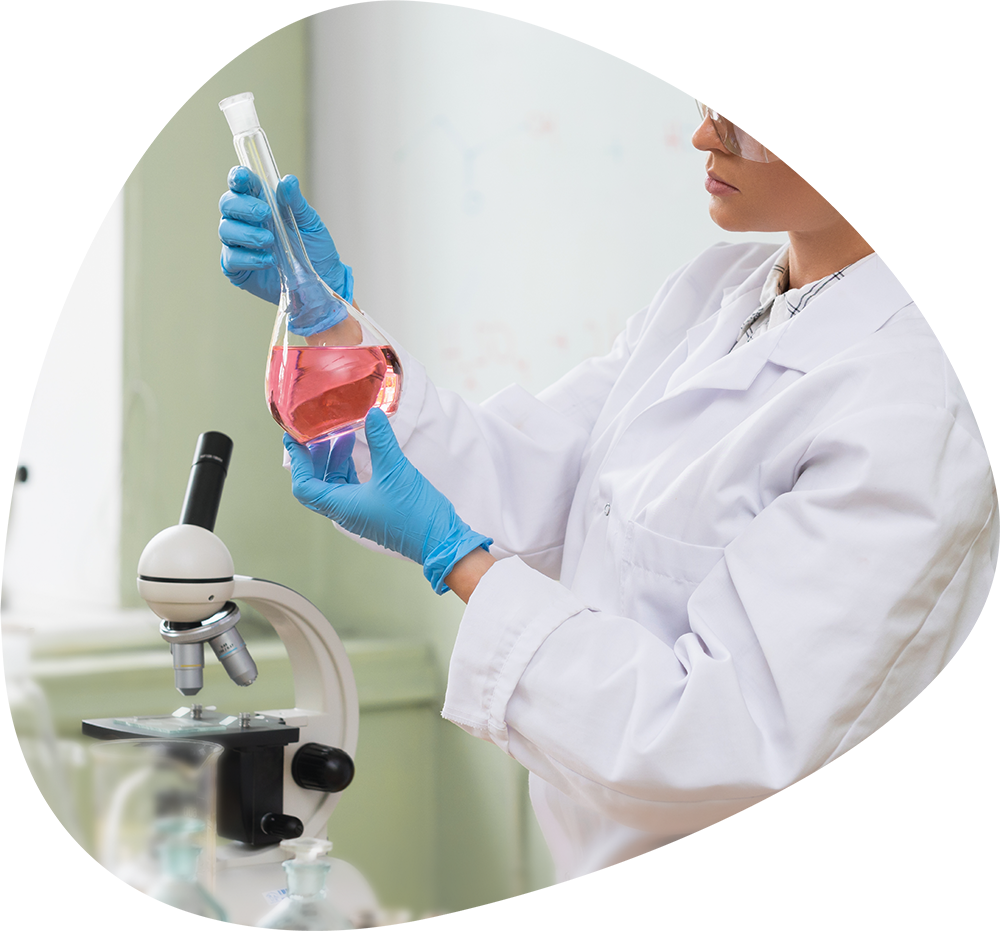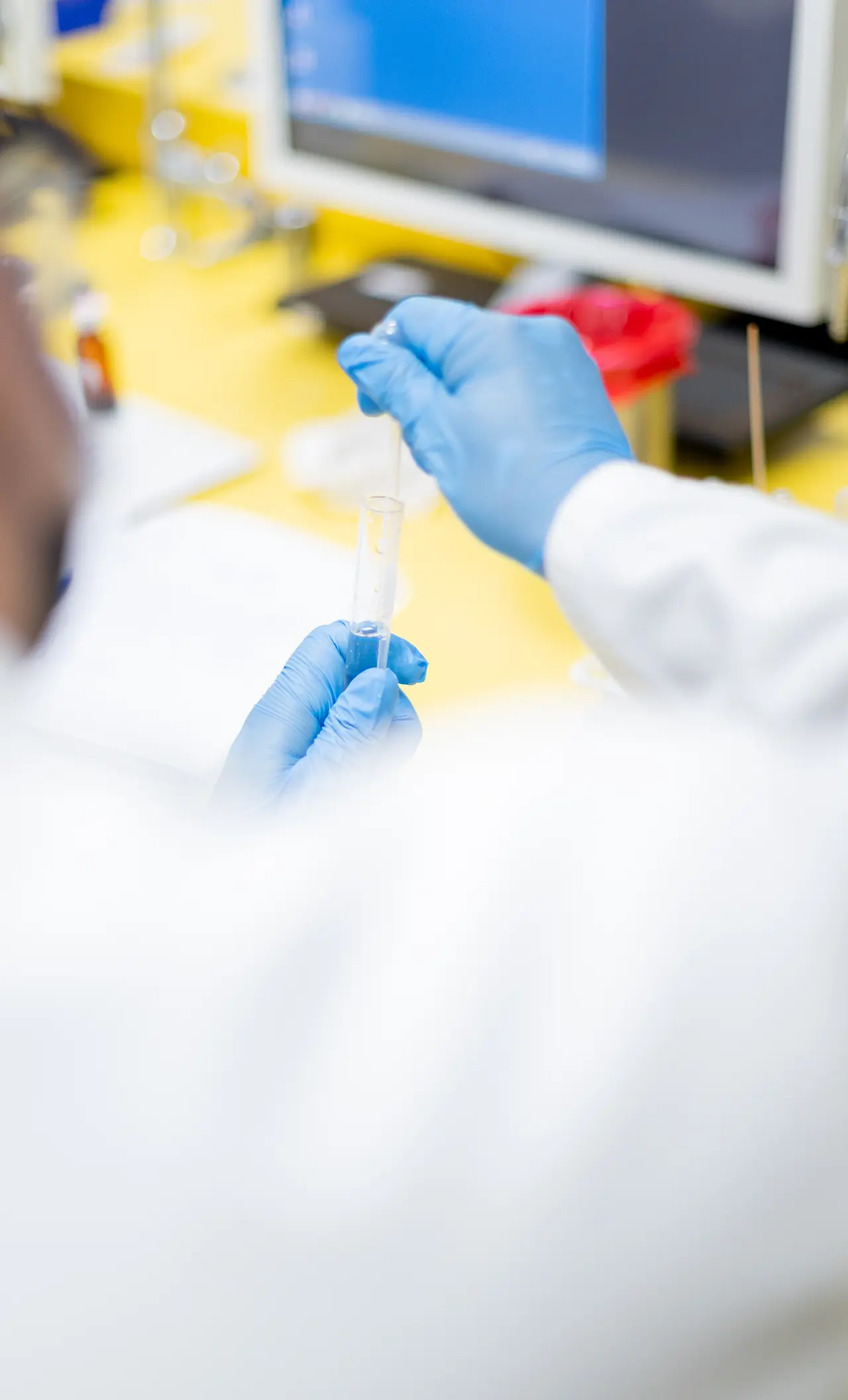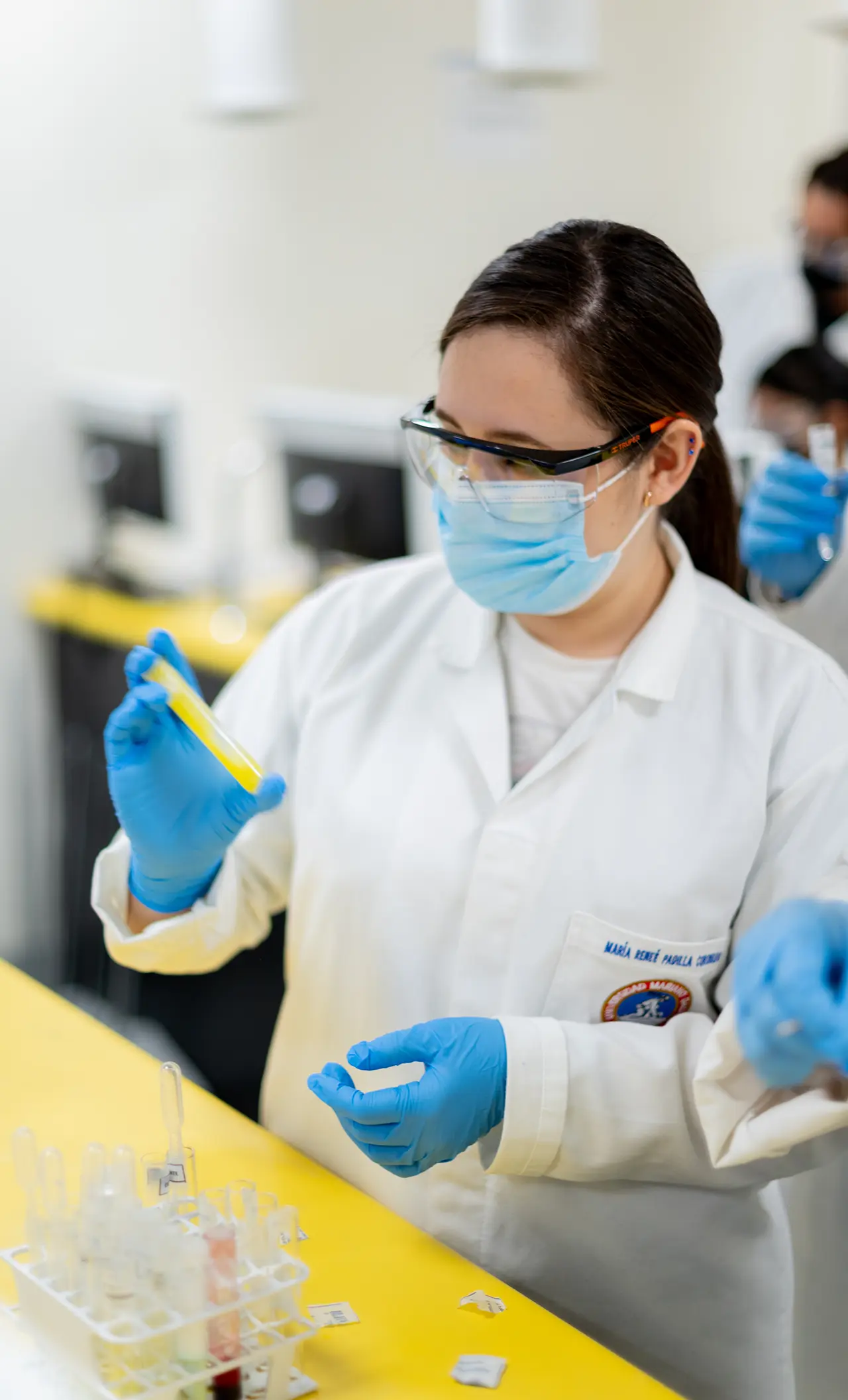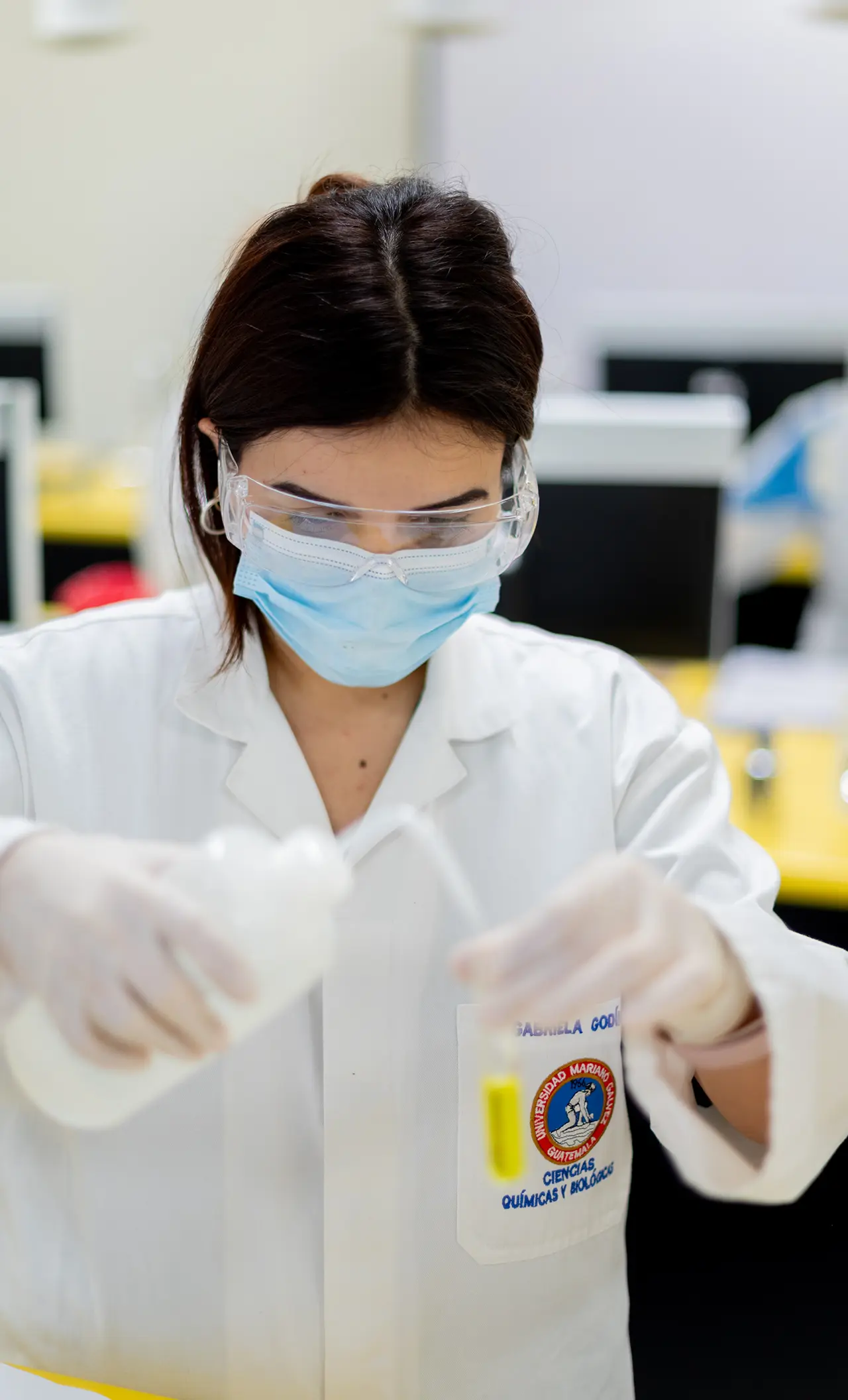
- Bachelor's Degree in
- Pharmaceutical Chemistry
- Degree to be obtained
- Degree in Pharmaceutical Chemistry
- Academic degree
- Bachelor's Degree
- Duration
- 5 years and a half
- Modality
- In-person
- Schedule:
- Daily Morning Session
- Career description
-
Pharmaceutical Chemists who graduate from the Mariano Gálvez University can work in both the health and industrial areas in all technological branches.
They can join research and teaching projects at the highest level. In the industrial sector, they can plan, implement, direct, lead, and carry out quality control of the production processes of both medicines and cosmetics. They will also be able to be in charge of pharmacies in private clinics, public and private hospitals, pharmaceutical laboratories, etc. They will be able to develop new technologies, formulate products, and improve their therapeutic properties. Due to their training in molecular sciences, they will be able to contribute to identifying the genetic bases of individual differences in response to drugs, forming part of multidisciplinary teams that seek to make personalized medicine, and managing to shorten response times and reduce the adverse effects of pharmacological therapies.
- What will you learn during the program?
-
Students enrolling in the Pharmaceutical Chemistry program at the Mariano Gálvez University must have basic knowledge of mathematics, physics, chemistry, biology, and language, as well as mastery of basic computer equipment and programs (word processing, spreadsheets, presentations, and internet). In addition, they must have successfully completed secondary education, preferably with a scientific orientation.
During their career, students should have the ability to read and understand scientific texts, good writing skills, the ability to analyze and synthesize, the ability to apply appropriate study techniques, the ability to systematize knowledge, the ability to work in a team, and full-time dedication to their studies and internships. Each student must abide by the University's regulations, taking care of their ethical, moral, and social behavior.
Gallery
AdmissionProfile
Students enrolling in the Pharmaceutical Chemistry program at the Mariano Gálvez University must have basic knowledge of mathematics, physics, chemistry, biology, and language, as well as mastery of basic computer equipment and programs (word processing, spreadsheets, presentations, and internet). In addition, they must have successfully completed secondary education, preferably with a scientific orientation.
During the course of their career, students should have the ability to read and understand scientific texts, good writing skills, the ability to analyze and synthesize, the ability to apply appropriate study techniques, the ability to systematize knowledge, the ability to work in a team, and full-time dedication to their studies and internships. As part of the student body of Mariano Gálvez University, each student must abide by the University's regulations, taking care of their ethical, moral, and social behavior.
Graduate'sProfile
1. Performs physico-chemical analyses of raw materials, in-process, and finished products of the pharmaceutical and cosmetic industry.
2. Participates in processes for the preparation of pharmaceutical formulas, and biological and cosmetic products.
3. Assumes the management, leadership and consultancy of pharmaceutical services, within the public and private health sector, ensuring that the services under his/her responsibility are adequate and comply with the strictest quality standards and requirements.
Career Opportunities

Laboratories in the pharmaceutical industry of medicines, cosmetics, disinfectants, fortified foods, and phytopharmaceuticals in the areas of administration, production, research, quality control, quality management, and marketing.
Work in hospitals in the areas of pharmaceutical care, single-dose, supply logistics management, hospital administration, parenteral nutrition preparation, pediatric readaptation, and dermatological products. Forensic, toxicological, and drug regulatory work. At the level of pharmaceutical legislation in the authorization and supervision of pharmaceutical establishments, evaluation and authorization of dossiers for the registration of pharmaceutical products.
Curriculum
| 1° Ciclo | ANATOMIA HUMANA I | BIOLOGIA GENERAL I | DESARROLLO HUMANO Y PROFESIONAL | MATEMÁTICA APLICADA | METODOLOGIA DE INVESTIGACIÓN | QUIMICA INORGANICA I | |
|---|---|---|---|---|---|---|---|
| 2° Ciclo | ANATOMIA HUMANA II | BIOLOGIA GENERAL II | CALCULO DIFERENCIAL E INTEGRAL | FISICA I | QUIMICA INORGANICA II | REDACCION TECNICA | |
| 3° Ciclo | ANÁLISIS QUIMICO I | BIOLOGIA CELULAR | CALCULO AVANZADO | FISICA II | FISIOLOGIA HUMANA I | QUIMICA ORGANICA I | |
| 4° Ciclo | ANÁLISIS QUIMICO II | BIOESTADISTICA | BOTANICA APLICADA I | FISIOLOGIA HUMANA II | MICROBIOLOGIA GENERAL | QUIMICA ORGANICA II | SOCIOLOGÍA |
| 5° Ciclo | ANÁLISIS INSTRUMENTAL I | BIOQUIMICA I | BOTANICA APLICADA II | FARMACOQUIMICA I | FISICOQUIMICA I | FISIOPATOLOGIA I | |
| 6° Ciclo | ANÁLISIS INSTRUMENTAL II | BIOQUIMICA II | FARMACOGNOSIA | FARMACOQUIMICA II | FISIOPATOLOGIA II | TECNOLOGIA FARMACEUTICA | |
| 7° Ciclo | ASISTENCIA FARMACOTERAPEUTICA | BIOLOGIA MOLECULAR | BUENAS PRACTICAS DE MANUFACTURA | FARMACIA APLICADA | FARMACOLOGIA I | FITOQUIMICA | |
| 8° Ciclo | BIOINFORMATICA | BROMATOLOGIA Y TECNOLOGIA DE ALIMENTOS | ELABORACIÓN Y EVALUACIÓN DE PROYECTOS DE INVESTIGACIÓN | FARMACOLOGIA II | LEGISLACION FARMACEUTICA | TECNOLOGIA BIOMOLECULAR I | TECNOLOGIA COSMETICA |
| 9° Ciclo | ADMINISTRACIÓN Y MERCADEO | BIOETICA | FARMACOGENOMICA | FARMACOLOGIA III | GESTIÓN DE CALIDAD | TOXICOLOGIA | TRABAJO DE GRADUACIÓN I |
| 10° Ciclo | PRACTICA SUPERVISADA | TRABAJO DE GRADUACIÓN II | |||||
| 11° Ciclo | PRACTICA PROFESIONAL |


